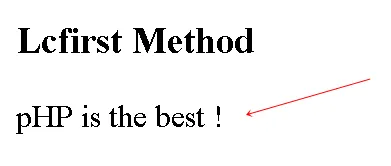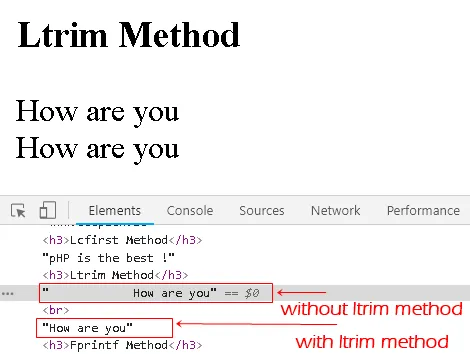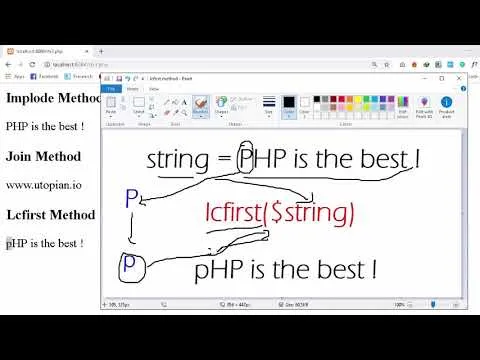
Repository
https://github.com/php/php-src
What Will I Learn?
I will learn the string methods this is the third part , we will take the " Implode, Join, Lcfirst, Ltrim and Fprintf " methods.
- How to convert from array to string using " Implode " method.
- What's the " Join " method and its uses.
- How to transform the first letter of a string to lower case by " Lcfirst " method.
- How to remove special caracters from the left of a string using " Ltrim " method.
- What's the " Fprintf " Method and how to format the string.
Requirements
- Server support PHP , Xampp or Wamp for example
- An IDE like Sublime text.
- Browser (Chrome for example)
Difficulty
- Basic
Description
1 - Implode Method :
The implode function assembles the array elements to form a text string using the glue parameter.
It accepts parameters in any order they were However, in order to approve the explode method we need to follow this order of parameters
- The first parameter is the Glue : By default, it's specified a blank text string.
- The second parameter is the Pieces : The data array from which we form the text string.
The implode function returns a text string that contains all the elements of the array and the same order within the array, with the addition of the glue parameter between the elements.
To use the implode method we need to pass two parameters
implode(glue, pieces);
I have an array of string and I want to form a string using the elements of this array
$array = array("PHP", "is", "the", "best", "!");
$str = implode(" ", $array);
echo $str;
The implode method will return the elements of the array with the space between them as a string and this is the result

2 - Join Method :
The join function returns a string of array elements. It has two parameters :
The first is the separator : By default, it is worth the empty string . This is not the recommended use of the join method. We recommend that you always use both settings to be compatible with older versions.
The second is the array : Which is The array of chains to collect.
To use the join method we need to pass two parameters
join(separator , $array );
The same example , I have an array and I will form a string using the elements of the array and the separator
$array2 = array("www", "utopian", "io");
$str2 = join(".", $array2);
echo $str2;
The separator is the point " . " , the join method will return a link " www.utopian.io " and this is the result

3 - Lcfirst Method :
The lcfirst method returns a string whose first character was lowercased, if that character is an alphabetic character. The 'alphabetical' is determined by the current locale.Currently, characters like a-umlaut (ä) will not be converted.
It has just the String as parameter and it returns a string.
To use the lcfirst method we need to pass the string as parameter
lcfirst($string);
I have a string and I want to change the form of the first letter without CSS proprieties using the lcfirst method
echo lcfirst($str);
The lcfirst return the string , we can directly print it using " echo " method

4 - Ltrim Method :
The ltrim method will remove spaces or other predefined characters from the beginning of the string. This function returns the string, after removing the invisible characters from the beginning of the string.
If the second charlist parameter has been omitted, ltrim will remove the following characters:
- " " (ASCII 32 (0x20)), an ordinary space.
- "\ t" (ASCII 9 (0x09)), a tab.
- "\ n" (ASCII 10 (0x0A)), a new line (line feed).
- "\ r" (ASCII 13 (0x0D)), a carriage return.
- "\ 0" (ASCII 0 (0x00)), the character NUL.
- "\ x0B" (ASCII 11 (0x0B)), a vertical tab.
It has two parameter the string and the charlist and it returns a string.
To use the ltrim method we need to pass the string
ltrim($string);
I have a string with spaces at the beggining , I want to remove them using the ltrim method

5 - Fprintf Method :
The fprintf method writes a text string formatted with the format parameter to a path defined by the handle. It has two parameters :
The first is The handle : From file system resources, which is typically created via the fopen function.
The second is the format : We have many options :
- % : Percentage sign. No media required.
- %b: will be treated as an integer and presented as a binary number.
- %c: will be treated as an integer and presented as a character with the corresponding ASCII value.
- %d: will be treated as an integer and rendered as a decimal (with a reference).
- %f: will be treated as a decimal and displayed as a decimal point number
- %g: shortcut to use% e and% f. o: will be treated as a valid number and presented as an octal number.
- %s: will be treated as a text string.
- %u: will be treated as an integer and rendered as a decimal (non-location).
- %x: The argument will be treated as an integer and presented as hexadecimal (in lower case).
- %X: The argument will be treated as an integer and presented as hexadecimal (in capital letters).
To use the fprintf method we need to pass two parameters
fprintf($file, format);
I want to write a number with many format in new file " utopian.txt "
$num = 22;
$file = fopen("utopian.txt", "w");
echo fprintf($file, "%d", $num);
The fprintf method return the length of characters in the file , I have the number = 22 and depending on the "% " the format will be changed


Video Tutorial
Curriculum
- PHP Tutorial #01 Indexed Arrays, Associative Arrays and Multidimensional Arrays
- PHP Tutorial #02 Array Methods (Sort, Rsort, Ksort, Krsort , Array_Reverse And Shuffle)
- PHP Tutorial #03 Array Methods ( Search Methods , Addition Methods and the Remove Methods)
- PHP Tutorial #04 Array Methods (Array_Sum, Array_Rand, Array_Column and Array_Unique)
- PHP Tutorial #05 Array Methods (Array_Chunk, Array_Combine, Array_Count_Values and Array_Product)
- PHP Tutorial #06 Array Methods (Array_Fill_Keys,Array_Fill, Array_Flip and Array_Filter)
- PHP Tutorial #07 Array Methods ( Array_Keys, Array_Map, Array_Merge and Array_Pad )
- PHP Tutorial #08 Array Methods ( Array_Replace, Array_Values, Array_Slice and Array_Intersect )
- PHP Tutorial #09 Array Methods (Array_Walk, Current, Next, Prev, End and Reset )
- PHP Tutorial #10 Array Methods (Array_Diff_Key, Array_Diff, Array_Intersect_Key and Array_Change_Key_Case )
- PHP Tutorial #11 String Methods ( Addslaches, Chr, Chop and Chunk_splite )
- PHP Tutorial #12 String Methods ( Bin2Hex, Count_Chars, Explode and Hex2Bin )
Proof of Work Done
https://github.com/alexendre-maxim/PHP-Tutorial/blob/master/str3.php
